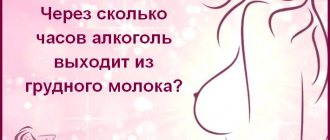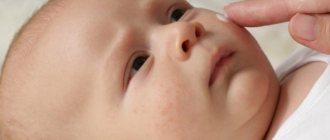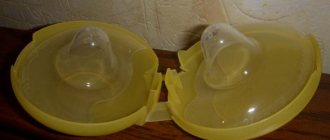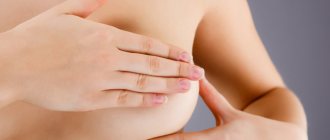Harmful effects of Citramon on the baby's body
The combined drug Citramon belongs to the group of non-narcotic analgesic and psychostimulant drugs. It consists of three components that have a certain effect on the human body.
Acetylsalicylic acid
The usual name for us is aspirin. It lowers body temperature, has an anti-inflammatory effect and eliminates dental, headache, joint, menstrual and other types of pain. But despite such merits, some civilized countries have refused to use it not only for children, but also for adults. And that's why:
- getting on the gastric mucosa, acetylsalicylic acid has a strong irritant effect, which can lead to ulceration and the development of gastrointestinal bleeding;
- and even if it doesn’t come to this, irritation is manifested by soreness, nausea, vomiting;
- acetylsalicylic acid in Citramon has a toxic effect on the brain, kidneys, and liver;
- the anticoagulant effect of aspirin leads to blood thinning and facilitates its easier passage through the vascular pores into the surrounding tissues, leading to the development of easy bruises and hemorrhages in the skin, mucous membranes and internal organs;
- acetylsalicylic acid, like other medicinal substances, can cause an allergic reaction.
Of course, the concentration of aspirin in breast milk is not that high, but the baby’s body is still very tiny. Therefore, it is enough to cause similar phenomena in the baby.
Caffeine

Increases the activity of the central nervous system, causing overexcitation. Children become restless and hyperactive, sleep is disturbed with a tendency to insomnia. And uncontrolled intake of Citramon, which contains caffeine, by a nursing mother can even lead to uncontrollable small twitching of the arms and legs (tremor). Following such a nervous outburst after caffeine is removed, the baby becomes lethargic, drowsy and exhausted.
Caffeine has been shown to cause instability in plasma glucose levels. And its concentration directly affects the child’s appetite. He becomes capricious in food: too hungry or, conversely, refuses to feed.
Paracetamol
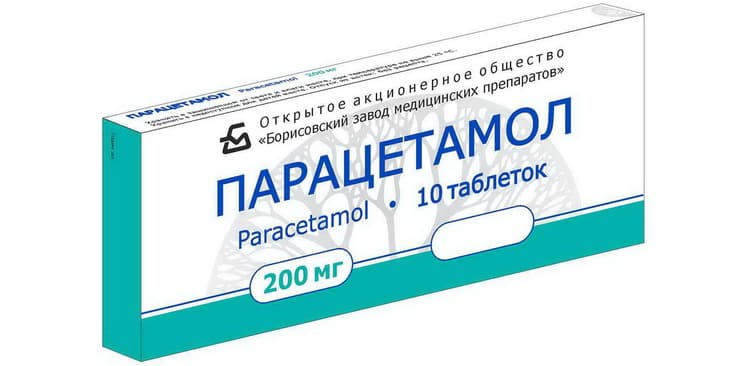
As an independent drug, Paracetamol is not contraindicated during breastfeeding due to minimal toxicity and poor penetration into breast milk. And in the combination drug Citramon there is even less paracetamol. But its pharmacological “neighbors” in Citramon are harmful to the baby, so it is better to use paracetamol in its pure form.
Important! The same composition is found in Citramon’s analogues – Askofen and Citropak.
Their use as an anesthetic is also contraindicated during breastfeeding.
Medicine: composition and action
Pharmacies sell Citramon without a prescription. The medicine has a triple effect on the human body:
- relieves pain;
- reduces fever;
- relieves inflammation.
The active substances included in the Citramon tablets have a complex effect. Acetylsalicylic acid reduces severe inflammation and fever.
According to the classification, it is a non-steroidal anti-inflammatory drug.
Caffeine, the second component of Citramon, relieves headaches . Under its action, the blood vessels of the brain narrow, which helps with severe migraine attacks. The third active ingredient of Citramon is paracetamol. This substance reduces pain and fever.
Alternative Treatment
When breastfeeding, you should be especially careful about everything that enters the mother’s body, and in this situation, “treatment” does not imply “self-medication.” Taking one pill is all right. But the systemic use of drugs must be discussed with the local doctor, determining the cause of the pain syndrome, prescribing a specific dosage form, its dosage and frequency of administration.
Indications for the use of painkillers and examples of approved drugs
No doctor will advise you to endure pain during breastfeeding for a long time. After all, the mother’s condition, her nervousness, and the release of responsive biologically active substances into the blood have a negative impact on the child. What can hurt a nursing woman during the period of recovery after childbirth?
Head

The most common reason is fatigue due to increased psycho-emotional stress. This, by the way, is most often the reason for the massive use of Citramon.
- Less often, young mothers get headaches when their blood pressure changes: hypotension or hypertension.
- It happens that relatives “bring” a viral infection into the house, the obligatory and, often, first symptom of which is intense headaches.
- Chronic diseases of the ENT and visual organs in the mother also lead to pain syndrome, from the exacerbation of which not a single woman is insured during lactation.
Stomach
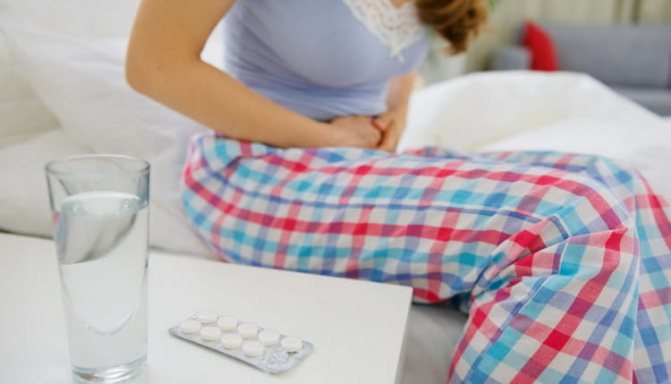
It’s good if the pain syndrome is caused by simple bloating when eating foods that provoke it, or, for example, by the first menstruation after childbirth. But there may be more serious reasons.
- Inflammatory diseases of the abdominal organs, acute and chronic: appendicitis, salpingitis, adnexitis, cholecystitis, peptic ulcer, etc., necessarily manifested by other symptoms characteristic of them. Citramon, and other painkillers in this situation, will only erase the clinical picture and interfere with diagnosis.
- Endometritis caused by infection on the extensive wound surface of the uterine cavity should be included in a separate column. In this case, discharge after childbirth, accompanying pain in the lower abdomen, will be pathological in nature, the temperature will rise, general weakness and signs of intoxication will rapidly increase.
Postoperative suture after caesarean section
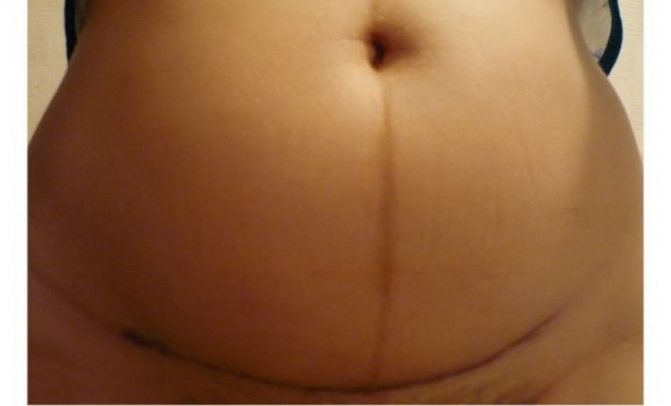
When discharged from the hospital, the sutures are usually removed. And if discomfort appears “due to the weather,” then in a few months it will go away even without Citramon.
- Nagging pain in the suture area after a cesarean section may indicate that not all the threads have been removed. In this situation, there is a high probability of inflammation and then the development of a fistula. Beginning discharge and an increase in local temperature should force you to seek medical help.
- Pain syndrome in a fresh scar, accompanied by itching, often develops as a result of intraoperative introduction of scraps of the uterine mucosa into the wound and their subsequent engraftment. This condition is called extrinsic endometriosis. As soon as menstruation begins, this fragment will function similarly to the endometrium, i.e., it will also menstruate, which is an indication for surgical removal of the scar.
Mammary gland
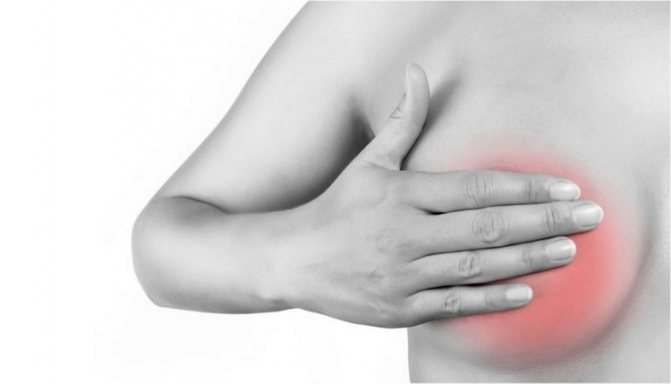
Pain at the very beginning of breastfeeding indicates improper preparation of the breast for feeding or inept latching of the baby. As a rule, the nipple and areola hurt. Advice from a local obstetrician-gynecologist will help quickly save the situation. The appearance of redness, local hyperthermia, cracks, bleeding or suppuration, seals, both in this area and in the breast tissue, require the intervention of an experienced specialist. Postpartum mastitis is a fairly serious complication that can result in surgery.
Teeth
Healthy teeth can hurt with trigeminal neuritis, most often after being in a draft. Well, with bad teeth – everything is clear.
Joints
Pain can develop for various reasons, including serious pathology of the musculoskeletal system. Therefore, consultation with a specialist is mandatory.
Permitted pharmaceutical products
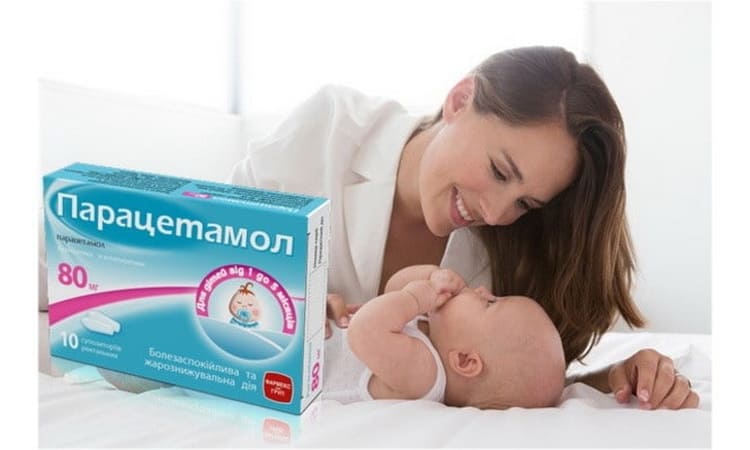
Before doing anything, you need to figure out what specific cause led to the development of the pain syndrome. If it is relieved with painkillers for a short time, or is accompanied by any other symptoms, then you should consult a doctor.
For episodic and isolated pain during breastfeeding, general medications are allowed that can be given to newborns :
- Paracetamol;
- Panadol;
- Ibuprofen;
- Ivalgin;
- Ibuprex;
- Advil;
- Nurofen;
- Ketoprofen;
- Naproxen.
They are available in various dosage forms, and you can choose the most optimal one for yourself.
In addition, there are many approved medications for toothache with a local anesthetic effect , used in infants when teething and not absorbed into the blood:
- Dentol;
- Kamistat Baby;
- Kalgel.
One-time use of illegal painkillers
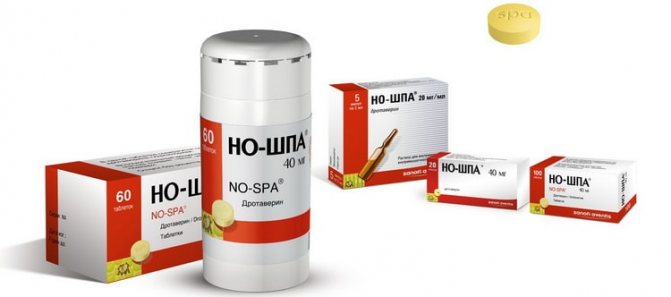
Some doctors agree that a single use of a prohibited drug will not harm the baby if you follow certain rules given below. Such drugs include Ketanov, No-shpa, and the same Citramon. However, before using them, it doesn’t hurt to at least call your doctor.
General rules for taking medications during lactation
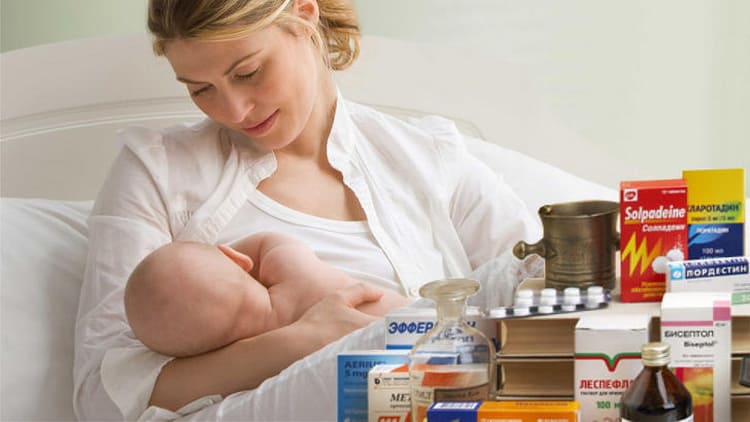
- Self-prescription of painkillers is acceptable only for episodic pain that is not accompanied by other symptoms.
- Taking medications while breastfeeding should begin by studying the instructions, which usually contain a section on the specifics of use during lactation. It is better not to take those medications whose instructions say “not studied.”
- It is forbidden to take the medicine in a dose and frequency exceeding those recommended in the instructions.
- The drugs should be taken immediately after feeding, then the next time their content in milk will be low.
- To further minimize the concentration of the drug in breast milk, it should be expressed before taking the drug, then breastfed at the right time, and the expressed milk should be given at the next feeding. At room temperature, it will not spoil within 6 hours, and breast milk can be stored in the general chamber of the refrigerator for a whole day. This is provided that the breasts are pre-washed and the dishes are sterile and sealed.
- In any case, the baby’s condition should be monitored especially closely. If side effects are suspected, the drug should be excluded even after a single use.
How to cope with pain without drugs

Let's agree that you will take painkillers on your own while breastfeeding only in connection with episodic headaches that are not associated with a specific pathology. Pain syndrome of another localization in the presence of additional symptoms of any disease requires the intervention of a specialist.
- The most important thing is to eliminate the cause and trigger factors: ventilate the room, get rid of sound and light stimuli, rest and get enough sleep (shift some responsibilities to your loved ones), drink soothing herbal teas (chamomile, St. John's wort, motherwort, lavender, mint).
- Light soothing music will also help, which will have a beneficial effect on the baby.
- And walking, for example, in the park with a stroller, will be useful for both of you.
- You should consult a physiotherapist for advice on aromatherapy. After all, not all aromatic oils that are partially absorbed into your body may appeal to your baby. By the way, the same specialist can also offer a course of acupuncture (acupuncture).
Video: Komarovsky about aspirin and paracetamol
The time interval during which a woman breastfeeds her child is considered especially responsible. The health of the baby and the dynamics of its development largely depend on the mother’s nutrition and the medications she uses. At the same time, women are not immune from toothache, headaches, and hyperthermia. A proven pain reliever will help eliminate discomfort.
Choosing an effective and safe remedy that will not harm the baby is not easy. A popular remedy for various types of pain and fever is Citramon Darnitsa or Citramon Borimed. These drugs are used by nursing mothers to eliminate pain syndromes. However, a woman should remember that Citramon is not recommended for use during breastfeeding.
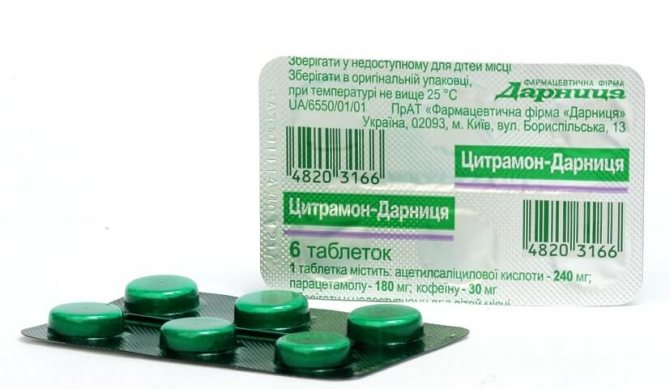
Let's draw conclusions
- Regular use of Citramon while breastfeeding is contraindicated.
- The exception is if there is nothing else at hand. In this case, Citramon can be taken 1 time, following the general rules for taking medications while breastfeeding.
- There are a lot of approved painkillers from pharmaceuticals and physiotherapeutic methods that can be easily used.
- You should not self-medicate, especially while breastfeeding. Any pain syndrome accompanied by pathological symptoms requires consultation with a doctor.
What pain-relieving methods do you use (or have you used) while breastfeeding? Perhaps your technique will be suitable for other breastfeeding mothers. Share it in the comments.
Dosage for a nursing mother
Taking a combination drug will not harm the baby if the nursing mother follows the dosage and takes the drug correctly.
A nursing mother should not take more than 1 tablet at a time. Many mothers manage to relieve pain by reducing the dose to 0.5 tablets.
The daily dose of the drug should not exceed 2 tablets during lactation.
The combination medication is usually used to provide relief. It is used less frequently as a medicinal drug. During breastfeeding, mothers should not take the medicine for more than 3 days in a row.

